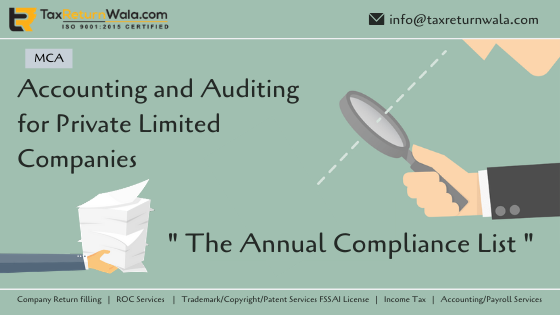MCA Guidelines for Accounting and Auditing for Private Limited Companies
Opting to form a private limited company for the low cost of registration, limited liability and low-risk is absolutely among other reasons a win-win choice. With business registered as a private limited company, the promoters not only receives tax benefits but also enjoys the benefit of ease in doing compliances.
With some certain benefits, some additional responsibilities and compliances towards the regulatory system also come into the picture. The Ministry of Corporate Affairs (“MCA”) issues guidelines for regular compliances by different form of entities registered under prescribed Acts in India which is mandatory to maintain stable workflow in the economy as the regulatory body operates to make sure uniform follow up of the guidelines by the stringent penalties and/or the explanation for non-compliance, as the case may be.
Upon incorporation, as a private limited company, and during its business operations, it is required to follow and fulfill certain compliances which are mandatory for keeping their existence valid & positive.
The post gives you an overview of all company annual filling compliances notified by the Ministry of Corporate Affairs (MCA) in view of Accounting and Auditing procedures for Private Limited Companies registered in India.
Compliance List for Private ltd Companies
#1. Annual General Meeting
As per Section 96 of the Companies Act, 2013 (“CA, 2013”), every company is required to complete its company annual filing obligation, for which it has to hold an Annual General Meeting (AGM) within 6 months after the financial year ends or the within 9 months as the case may be.
To hold an AGM, which is necessary for a Private limited company, such a meeting discusses the matters relating to the appointment of auditors, declaration of dividends, decisions for director’s remunerations and other statutory policies for the company. AGM can be conducted anywhere in the registered premises of business and in the presence of the required composition of directors and members.
As a part of company annual filling compliance, a Private ltd company has to file annual accounts, minutes and the essential audit reports received from the auditor to the ROC (Registrar of Companies). The annual filing of company compliance with ROC shall include filling of :
- Form MGT – 7 (Annual Return) within 60 days of holding AGM (Annual general meeting) in the company for the financial year.
- Form AOC – 4 (Financial Statements) which is inclusive of Audited Balance Sheet, P&L Account and Director’s reports to be submitted within 30 days of AGM.
#3. Director Report
Section 134 of the Act specifies for submission of Director Report stating their status in the company and holdings in other companies along with other required details.
#4. Audit Compliance & Appointment of Auditor
To assure that every company in their annual filing compliance presents a true and fair view of its financial position, Section 139 of the Companies Act, 2013 states for statutory audit of the company by an Auditor.
On preparation of accounts by a private ltd company, the same has to be audited through a certified Chartered Accountant or professional as notified under Section 141 of the act. The auditor will be responsible to submit the verified reports to the ROC.
For the appointment of auditor in a Private limited company, Form ADT -1 shall have to be used. The auditor shall be appointed for a block of 5 years.
#5. Filling of Income Tax Return
Section 208 of the Income Tax Act, 1961 specifies for the entities that are required to pay advance tax to the government. A private ltd company before lapsing of the due date have to file advance tax to government quarterly.
As said earlier, the financials of the company are to be audited from a tax auditor or a professional appointed for successful filling of Income-tax return.
#6. Maintenance of Statutory Registers and Records
Section 88 of the Companies Act mandates every private limited company registered to maintain a record of all registers and books of accounts of the company at an appropriate place accessible by authorities. The place can either be the registered office of the company or at a place referred by the company documents.
The records as a part of the company’s annual filing compliance and preservation rules are to be preserved for a minimum tenure of 8 years.
#7 Consequences for Non-compliance
For non-compliance with the above provisions, not only the company but every person found in default shall be charged with huge monetary penalties which might even extend to imprisonment in severe cases.
Taxreturnwala.com offers you a common platform to get you complied
with all legal requirements of business online.
Email us at info@taxreturnwala.com
Also Read: Highlights of PPF Scheme 2019


